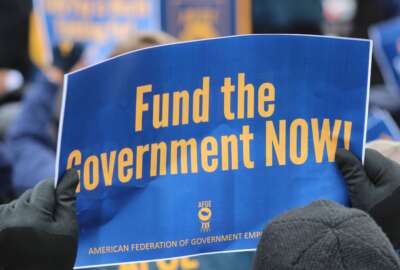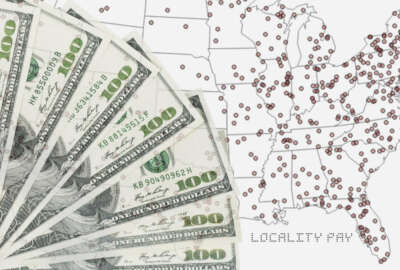Hubbard Radio Washington DC, LLC. All rights reserved. This website is not intended for users located within the European Economic Area.
Are federal employees headed for another big raise next year?
Fresh off a 5% pay raise, federal employees can look forward to some other enhancements coming their way, like the possibility of another hefty pay raise next y...
Fresh off a 5% pay raise, federal employees can look forward to some other enhancements coming their way, like the possibility of another hefty pay raise next year. For more on this and a few other matters, the Federal Drive with Tom spoke with John Hatton, the vice president for Policy and Programs at the National Active and Retired Federal Employees Association (NARFE).
Interview Transcript:
Tom Temin And let’s talk about the FAIR Act federal pay rate increase for 2025. This is kind of a perennial where they look for not double digits but high single digits.
John Hatton Yeah. And so this is kind of a marker for members of Congress pushing for federal pay raises. In this case, Congressman Gerry Connolly(D-Va.) in the House and Senator Schatz (D-Hawaii) in the Senate. And I would say this is more of a negotiating tool for them in terms of trying to put this marker down as you get into the appropriations season. So the federal pay raise is typically based off of the most recent change in the employment cost index for private sector wages and salaries. So if you’re looking at that ended in 2023, it’s 4.5%. That’s typically reduced down by half a percent down to four for that across the board pay increase. That’s probably what you’re going to expect to see in Biden’s budget. If they’re looking to keep that same pay rate policy going forward, that they include a certain amount in this case, in recent cases, 0.5% for locality pay. The Fair act says, let’s go a little bit higher on locality pay, there’s a large pay gap between federal employee pay, similar private sector jobs of 27%. So they’re looking for a 3.4% increase in locality instead of that point five percentage point increase.
Tom Temin And locality is spreading like wildfire in some sense to every year there are new regions. And you wonder how did that get to be a locality pay. It’s harder to find places that aren’t locality pay.
John Hatton Yeah, there’s still this general breast of US locality pay, which actually also increases from the base to an extent different geographic areas continue to be above that, you’re going to have these new locality pay areas crop up. But certainly in large metropolitan areas, whether it’s San Francisco or New York or in the DC area, people are paid more because the cost of living is higher and wages are higher. So it is good policy, I think, to adjust pay for what the market rate is in that area.
Tom Temin And what is the latest thinking on whether federal employees are paid more or less than their counterparts in the private sector? I’ve always felt that, yes, some of them are underpaid. Some of them are actually better than the private sector. I don’t think there’s any single index that makes any sense because of the range of jobs involved.
John Hatton Yeah, what the federal government uses is the Federal Salary Council. And they try to match job to job, similar private sector jobs with the federal jobs and come up with some percentage difference, which is supposed to inform the changes in locality pay. And they found that taking that all in aggregate, there’s a 27% difference where the private sector gets paid more than federal jobs. Now, that’s not taking into account benefits. The Congressional Budget Office has looked at this before, they look at less of a job to job comparison and more of a human capital approach. So people with similar experience, people of similar educational backgrounds and what are they getting paid? And they find kind of the most educated in the federal workforce are paid less than their private sector counterparts. But if you get down to the lower educational levels, they’re actually paid a little bit more when you’re taking into account benefits and everything else. So depends on how you’re analyzing it, it’s complicated, but I think certainly there are plenty of cases where pay needs to go up to be competitive with the private sector in recruitment.
Tom Temin And in the last couple of years, you’ve probably noticed, as we have, that lots of agencies are getting spot authority to offer extra pay, extra benefits, extra hiring eases for strategically important jobs they might need. It’s fairly widespread, though.
John Hatton Yeah, I think that’s one of the justifications for the Fair Act or trying to close that locality pay gap is how much agencies are pushing for these special pay authorities so that they can actually recruit people, because what is being provided under the basic or general schedule system isn’t enough. So I don’t know if any one year that locality pay increase is going to be 27%, but little inches of work would help prevent kind of these situations where agencies are really struggling to recruit people because their pay is low.
Tom Temin Especially in an age when a pack of potato chips at the grocery store is five bucks. We’re speaking with John Hatton, vice president for policy and programs at the National Active and Retired Federal Employees Association, NARFE. And the OPM data breach, this was back in 2015 kids, but it still resonates, doesn’t it? And there is something that would extend protection for people’s identities continuing. Tell us what’s going on there.
John Hatton Yeah. So just as a reminder, people, OPM allowed their database to be breached and personally identifiable information was revealed. Now, Congress responded to that by providing identity theft protection up to $5 million in insurance, but only for like the next ten years when they include it in appropriations bill. So there’s an effort to extend that information is out there hasn’t been put back in the box. So people may still need that protection resulting from that breach. So Delegate Eleanor Holmes Norton (D-DC.) introduced a bill to extend it. I think this will probably get a little bit more attention as we get closer to that expiration date, but it’s just a reminder to people that, yes, your data still may be out there, you still may need some of this protection and it should be the obligation of the federal government which gave it away to provide you with that identity theft protection.
Tom Temin The strange thing about that data is that it never did manifest itself in any obvious way. There wasn’t some big giant phishing attack that hit a million federal employees or anything. No one really knew what happened to it or where it went, or if it ever was used in some manner.
John Hatton Yeah, I think it’s probably difficult to actually parse out whether, if you do have some identity theft or fraud attack on you, if it came from that OPM data breach or a target breach or something else, there’s data hacks all over the place. OPM is not the only place to be exposed in this realm, so I think the danger becomes when people can collect data from multiple sources and starts piecing together and piecing together, and they get a much clearer picture of you and your identity and how you operate the one piece of data or the one attack may not be itself the most, but certainly is relevant in this case.
Tom Temin And the other thing about such data, it does go stale because people change jobs, they move and so forth. So you got to act quick on it, especially if you’re going to launch a phishing attack based on what you know about that person at that moment.
John Hatton True, and some of that is email addresses. But I think in this case you’re talking about Social Security numbers, CSA numbers, just identities and addresses. Now, if you’ve moved and certainly there was concerns about people who were in intelligence agencies, people whose identities has been protected based on their top secret clearances or otherwise.
Tom Temin And eventually you retire and then you worry about pharmacy benefits and Medicare Part D haven’t had the pleasure of navigating those shoals yet, but it’s complicated. But now there is a bipartisan bill that would help with Medicare Part D and drug costs.
John Hatton Yeah. The House Committee on Oversight and Accountability advanced a bill that applies the FEHB. That was their jurisdiction. This was also going through energy and commerce and ways and means as to take it up as well. And it’s just an effort, and it’s nice to see some bipartisanship on this issue of drug pricing. And that would apply to federal retirees through FEHB. And now that more plans are integrating with Medicare Part D through that as well, and just prohibit some practices like the PBMs, negotiate drug prices, and they may get rebates, but they may not pass that rebate on to you as a consumer or the insurance companies that you’re paying the premiums for those claims, they made insure you to different pharmacies so you can’t go to the pharmacy you want. So some common sense legislation, getting at some drug pricing and getting at some of these practices that reduce your choice. So it’s good to see some bipartisanship, even in the midst of a very partizan environment, that some business can still get done and some improvements can still be made.
Tom Temin Yeah, that idea of the pharmacy benefits manager, I guess it had a good theory in that someone third party would argue with drug companies and get prices down, but it’s kind of turned into a profit center, almost, where the savings don’t necessarily get passed on to the actual buyer.
John Hatton Right now, they have an incentive to negotiate and get lower prices, but they don’t have the incentive to necessarily pass that on to the consumer as thoroughly as they should or could.
Copyright © 2024 Federal News Network. All rights reserved. This website is not intended for users located within the European Economic Area.
Tom Temin
Tom Temin is host of the Federal Drive and has been providing insight on federal technology and management issues for more than 30 years.
Follow @tteminWFED





